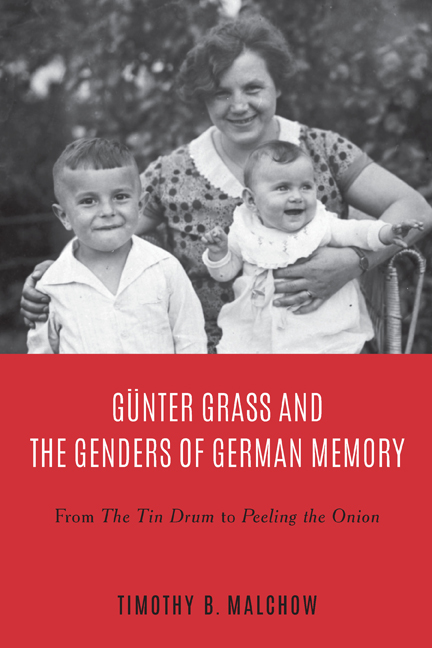Book contents
- Frontmatter
- Dedication
- Contents
- Acknowledgments
- Abbreviations, Translations, and Transcriptions
- Introduction
- 1 Grass’s Biography in Context: 1927–1959
- 2 Corporeal Memory, Trauma, and Art in The Tin Drum
- 3 Bildung, Heimat, and Gendered Modes of German Memory in The Tin Drum
- 4 A Patriarchal Arbiter of German Cultural Memory and His Feminized Others: Leveling Bildung, Opening Heimat, and Championing Art from the 1960s to the New Millennium
- 5 Grass’s Early Life Once Again: Broken Silence, Mourning, and Gendered Approaches to Memory in Peeling the Onion
- Epilogue
- Works Cited
- Index
- Frontmatter
- Dedication
- Contents
- Acknowledgments
- Abbreviations, Translations, and Transcriptions
- Introduction
- 1 Grass’s Biography in Context: 1927–1959
- 2 Corporeal Memory, Trauma, and Art in The Tin Drum
- 3 Bildung, Heimat, and Gendered Modes of German Memory in The Tin Drum
- 4 A Patriarchal Arbiter of German Cultural Memory and His Feminized Others: Leveling Bildung, Opening Heimat, and Championing Art from the 1960s to the New Millennium
- 5 Grass’s Early Life Once Again: Broken Silence, Mourning, and Gendered Approaches to Memory in Peeling the Onion
- Epilogue
- Works Cited
- Index
Summary
GÜNTER GRASS (1927–2015) repeatedly explored aspects of his early life in Nazi-era Danzig, during World War II, and in the young Federal Republic of Germany in literary form. The first and most famous variation appears in his premier novel, The Tin Drum (Die Blechtrommel, 1959). That fictional work draws heavily on its author's biography and the settings in which he lived. And yet, even though its protagonist's main problem is his inability to forget a traumatic past, it contains no direct allusion to either of the two episodes that were presumably most traumatic for Grass's own family. That is, it refers neither to his compulsory military service in the elite Nazi combat force, the Waffen-SS, nor to his mother's multiple rapes by Soviet soldiers at the end of World War II. In contemporary Germany The Tin Drum is still celebrated in superlative terms. A tribute published in the newsweekly Der Spiegel after Grass's death on April 13, 2015 called it the “most important German postwar novel” and the reason that he “embodied [German postwar literature] like no one else” (Hage 2015, 107). He won the Nobel Prize in Literature in 1999 largely on its merits. The novel has been translated into over fifty languages and then retranslated into ten for its fiftieth anniversary. Building on its legacy, the former enfant terrible Grass eventually gained a reputation as Germany's most important living author and a representative of the so-called German cultural nation (Kulturnation).
However, Grass's retelling of his early life forty-seven years later in Peeling the Onion (Beim Häuten der Zwiebel, 2006) tarnished that status, especially since that work revealed its muckraking author's public silence for over six decades on the subject of his own Waffen-SS service. A work of non-fiction, it contains obviously fictional and literary elements that irritated readers expecting a more earnest reckoning with the implications of his past. Contrasting with memory's insistence in The Tin Drum, the memoir presents its autobiographical narrator's central problem as the inability to remember aspects of his past. Rather than reflecting on his Nazi-era perpetrator status in a way that reconciles it satisfactorily with his public artist's role, what he manages to wrest from oblivion in the memoir is a highly personal, mournful exploration of his loss of his mother, who died within a decade of the war's end, and the meaning of her victimization and sacrifice for him.
- Type
- Chapter
- Information
- Günter Grass and the Genders of German MemoryFrom The Tin Drum to Peeling the Onion and Beyond, pp. 1 - 36Publisher: Boydell & BrewerPrint publication year: 2021

